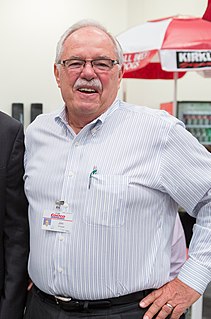A Quote by Thomas Pogge
We have this highly irrational system of incentivizing innovation for clean and green technologies, where we allow the innovator to have a temporary monopoly and then mark up the price of the product or sell licenses at high prices to those who want to use the kind of product that the innovator has invented. This system is collectively irrational because many people, to avoid the inflated prices of still-patented cleaner and greener technologies, opt for some older technology that is much more polluting.
Quote Topics
Related Quotes
It is irrational to charge high prices for socially valuable innovations as this guarantees that they will be underutilized. It is much better to sell them at cost and then to reward the innovator in some other way. This is not always possible, because in some cases the value of an innovation is in the eye of the beholder; it's very difficult to value how much a new Madonna song is worth, for example. But in the case of medicines, green technologies and seeds in agriculture, such an alternative reward mechanism is fairly straightforward.
The mere possession of monopoly power, and the concomitant charging of monopoly prices, is not only not unlawful, it is an important element of the free-market system. The opportunity to charge monopoly prices - at least for a short period - is what attracts 'business acumen' in the first place; it induces risk taking that produces innovation and economic growth.
We think of prices as simply the notation of how much we must pay for things. But the price system accomplishes far more than that. Hundreds of millions of people buying and selling, and abstaining from buying and selling, generate a system of signals - prices to producers and consumers about relative scarcities and demand. Through this system, consumers can convey to producers their subjective priorities and entrepreneurs can invest accordingly.
For the present system to work, poor people must be excluded from the innovation, because if they could get access at an affordable price, then affluent people would find ways to buy it cheaply as well - and then the innovator would be poorly rewarded and introductions of new medicines would decline.
People always get what they want. But there is a price for everything. Failures are either those who do not know what they want or are not prepared to pay the price asked them. The price varies from individual to individual. Some get things at bargain-sale prices, others only at famine prices. But it is no use grumbling. Whatever price you are asked, you must pay.
In the domain of pharmaceuticals, we need a metric for health impact, and with this metric we can then assess the value of the introduction of a new product and pay its innovator accordingly, say on the basis of the product's measured health impact during its first ten years on the market. In exchange, innovators must of course renounce the usual rewards they are otherwise entitled to, namely the patent-protected markup on the price of their product.
And there are some - Bernie [Ecclestone] and others - who are embracing new technologies. When Sky UK started to broadcast there was an argument that audience would come down because it is pay TV. But the actual quality of the production and the use of technology and the engagement of the viewer is much better than it ever was. The product is simply better.
You can't exceed the system with language. You can only exceed the system with events; recommended procedures that are better. You can't exceed the system by telling people to be good, be kind, be considerate... You have to take away the conditions that makes it necessary for you to be kind. And to be kind, you design highways that aren't slippery; where no accidents, or less accidents, occur. In the future, everybody becomes an innovator - a creator.
The incentive for the outsider is to attack the system right up to the moment he is co-opted by it. The incentive for the insider -and this took some getting used to- is to allow yourself to be attacked, and then co-opt your most ferocious attackers, and their best ideas. The effect on the system as a whole is to make it more stable, because everyone winds up working on its behalf.






































